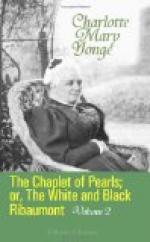Berenger could not bear to leave his wife near the Duke of Anjou and Narcisse, and he offered himself to the King as an actor in the masque, much as he detested all he heard of its subject. The King nodded comprehension, and told him it was open to him either to be a demon in a tight suit of black cloth, with cloven-hoof shoes, a long tail, and a trident; or one of the Huguenots who were to be repulsed from Paradise for the edification of the spectators. As these last were to wear suits of knightly armour, Berenger much preferred making one of them in spite of their doom.
The masque was given at the hall of the Hotel de Bourbon, where a noble gallery accommodated the audience, and left full space beneath for the actors. Down the centre of the stage flowed a stream, broad enough to contain a boat, which was plied by the Abbe de Mericour—transformed by a gray beard and hair and dismal mask into Charon.
But so unused to navigation was he, so crazy and ill-trimmed his craft, that his first performance would have been his submersion in the Styx had not Berenger, better accustomed to boats than any of the dramatis personoe, caught him by the arms as he was about to step in, pointed out the perils, weighted the frail vessel, and given him a lesson in paddling it to and fro, with such a masterly hand, that, had there been time for a change of dress, the part of Charon would have been unanimously transferred to him; but the delay could not be suffered, and poor Mericour, in fear of a ducking, or worse, of ridicule, balanced himself, pole in hand, in the midst of the river. To the right of the river was Elysium—a circular island revolving on a wheel which was an absolute orrery, representing in concentric circles the skies, with the sun, moon, the seven planets, twelve signs, and the fixed stars, all illuminated with small lamps. The island itself was covered with verdure, in which, among bowers woven of gay flowers, reposed twelve nymphs of Paradise, of whom Eustacie was one.
On the other side of the stream was another wheel, whose grisly emblems were reminders of Dante’s infernal circles, and were lighted by lurid flames, while little bells were hung round so as to make a harsh jangling sound, and all of the court who had any turn for buffoonery were leaping and dancing about as demons beneath it, and uttering wild shouts.
King Charles and his two brothers stood on the margin of the Elysian lake. King Henry, the Prince of Conde, and a selection of the younger and gayer Huguenots, were the assailants,—storming Paradise to gain possession of the nymphs. It was a very illusive armour that they wore, thin scales of gold or silver as cuirasses over their satin doublets, and the swords and lances of festive combat in that court had been of the bluntest foil ever since the father of these princes had died beneath Montgomery’s spear. And when the King and his brothers, one of them a puny crooked boy, were the champions, the battle must needs be the merest show, though there were lookers-on who thought that, judging by appearances, the assailants ought to have the best chance of victory, both literal and allegorical.




